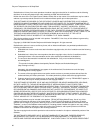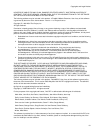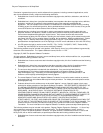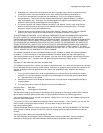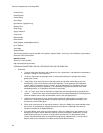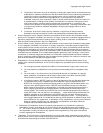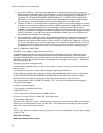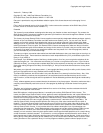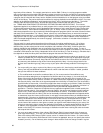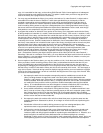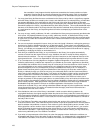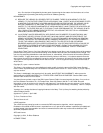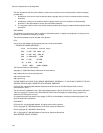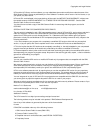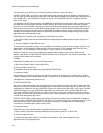Polycom Telepresence m100 Help Book
104
This means that you can select one of these four options and follow rules of that license.
SPECIAL EXCEPTION: Igor Pavlov, as the author of this code, expressly permit you statically or dynamically to
link your code (or bind by name) to the files from LZMA SDK without subjecting your linked code to the terms of the
CPL or GNU LGPL. Any modification or addition to any file in the LZMA SDK, however, is subject to the GNU
LGPL or CPL terms.
This SPECIAL EXCEPTION allows you to use LZMA SDK in applications with proprietary code, provided you keep
the LZMA SDK code unmodified. SPECIAL EXCEPTION #2: Igor Pavlov, as the author of this code, expressly
permits you to use LZMA SDK 4.43 under the same terms and conditions contained in the License Agreement you
have for any previous version of LZMA SDK developed by Igor Pavlov. SPECIAL EXCEPTION #2 allows holders
of proprietary licenses to use latest version of LZMA SDK as update for previous versions. GNU LGPL and CPL
are pretty similar and both these licenses are classified as free software licenses at http://www.gnu.org/ and OSI-
approved at http://www.opensource.org/.
LZMA SDK also is available under a proprietary license which can include:
1. The right to modify code from the LZMA SDK without subjecting the modified code to the terms of the CPL or
GNU LGPL
2. Technical support for LZMA SDK via email
To request such a proprietary license, or for any additional consultations, send an email message, using the 7-Zip
support page: Send message to LZMA developer The source code of 7-Zip is released under the terms of the
GNU LGPL. You can download the source code of 7-Zip at 7-Zip's Source Forge Page
Additional License(s) The license included with the software differs slightly from the version posted on the
website. Specifically it includes SPECIAL EXCEPTION #3, which is not present in the license on the website. The
license from the software archive follows:
LICENSE
LZMA SDK is available under any of the following licenses:
1) GNU Lesser General Public License (GNU LGPL)
2) Common Public License (CPL)
3) Simplified license for unmodified code (read SPECIAL EXCEPTION)
4) Proprietary license
It means that you can select one of these four options and follow rules of that license. 1,2) GNU LGPL and CPL
licenses are pretty similar and both these licenses are classified as "Free software licenses" at http://www.gnu.org/
"OSI-approved" at http://www.opensource.org/
3) SPECIAL EXCEPTION
Igor Pavlov, as the author of this code, expressly permits you to statically or dynamically link your code (or bind by
name) to the files from LZMA SDK without subjecting your linked code to the terms of the CPL or GNU LGPL. Any
modifications or additions to files from LZMA SDK, however, are subject to the GNU LGPL or CPL terms. SPECIAL
EXCEPTION allows you to use LZMA SDK in applications with closed code, while you keep LZMA SDK code
unmodified. SPECIAL EXCEPTION #2: Igor Pavlov, as the author of this code, expressly permits you to use this
code under the same terms and conditions contained in the License Agreement you have for any previous version
of LZMA SDK developed by Igor Pavlov.
SPECIAL EXCEPTION #2 allows owners of proprietary licenses to use latest version of LZMA SDK as update for
previous versions. SPECIAL EXCEPTION #3: Igor Pavlov, as the author of this code, expressly permits you to use
code of the following files: BranchTypes.h, LzmaTypes.h, LzmaTest.c, LzmaStateTest.c, LzmaAlone.cpp,
LzmaAlone.cs, LzmaAlone.java as public domain code.
4) Proprietary license
LZMA SDK also can be available under a proprietary license which can include:
1) Right to modify code without subjecting modified code to the terms of the CPL or GNU LGPL
2) Technical support for code
To request such proprietary license or any additional consultations, send email message from that
page:http://www.7-zip.org/support.html



